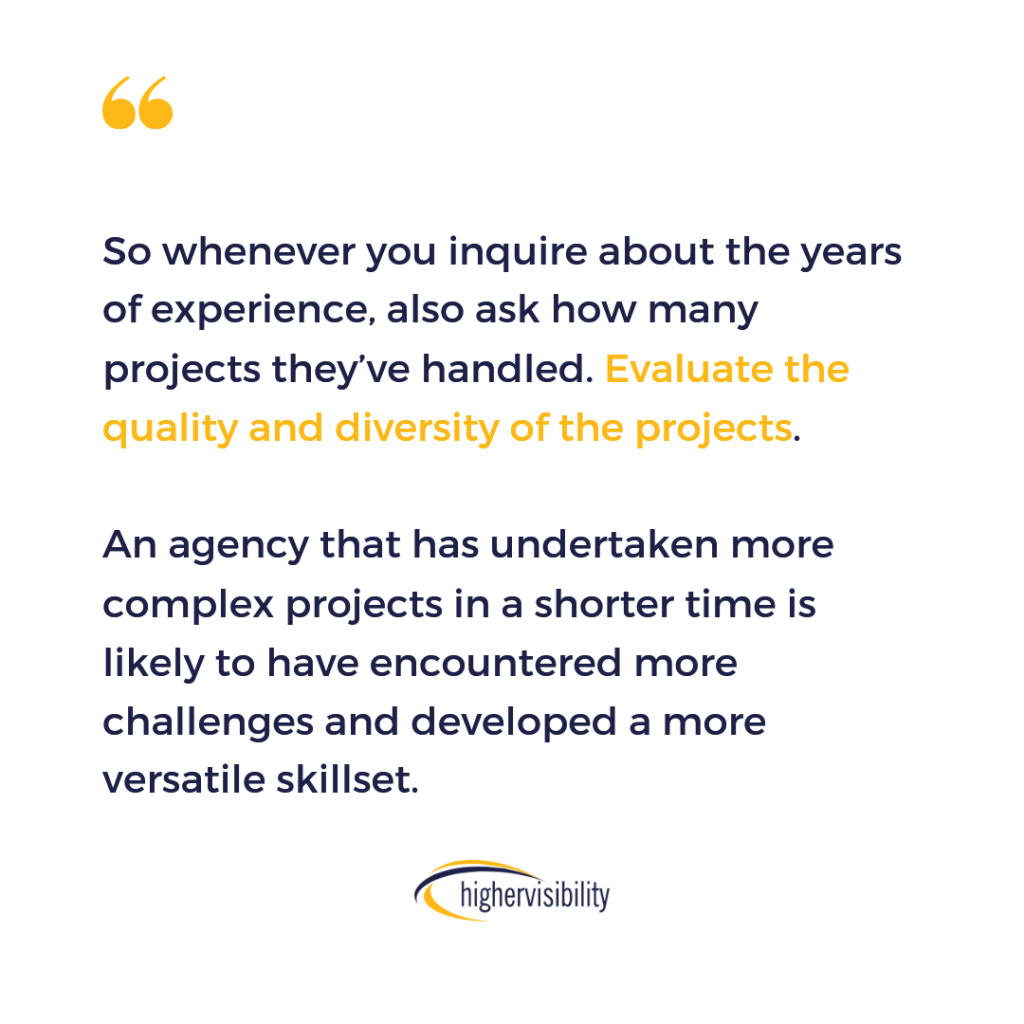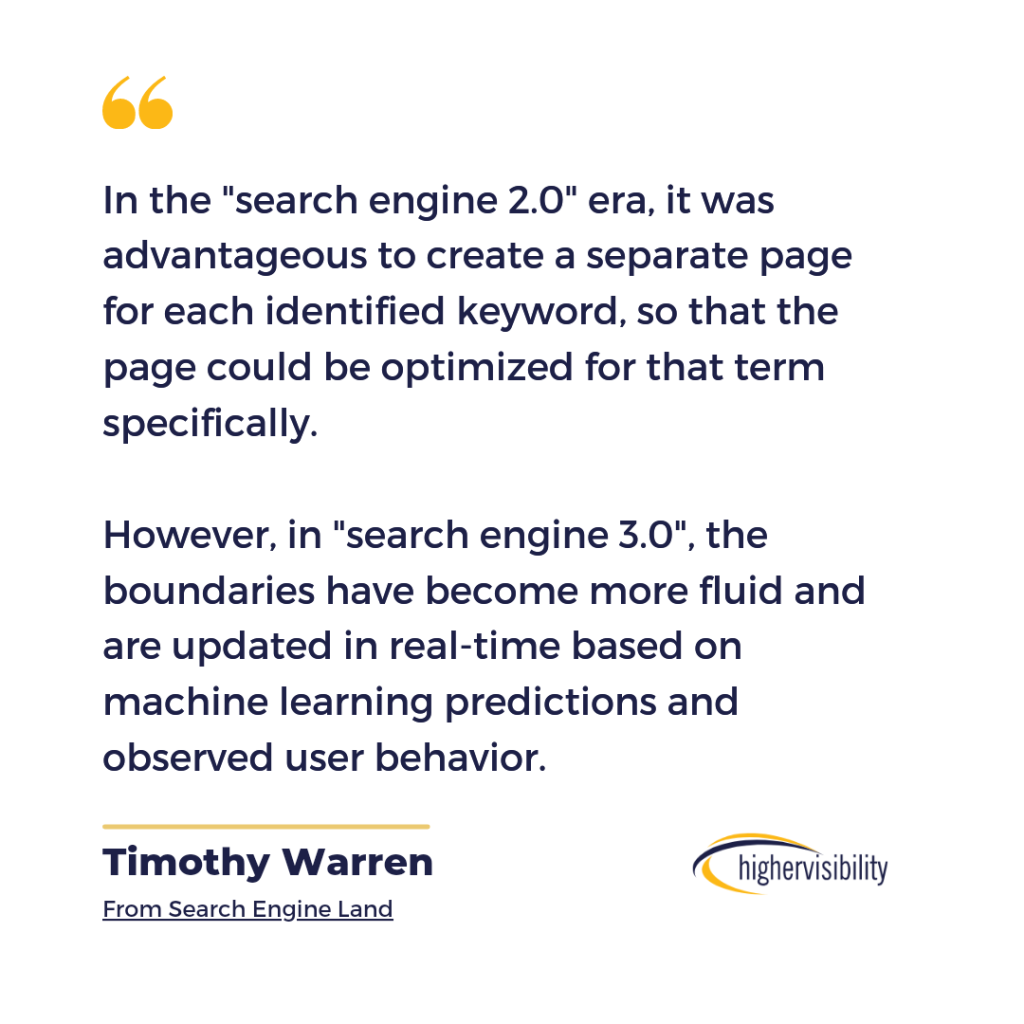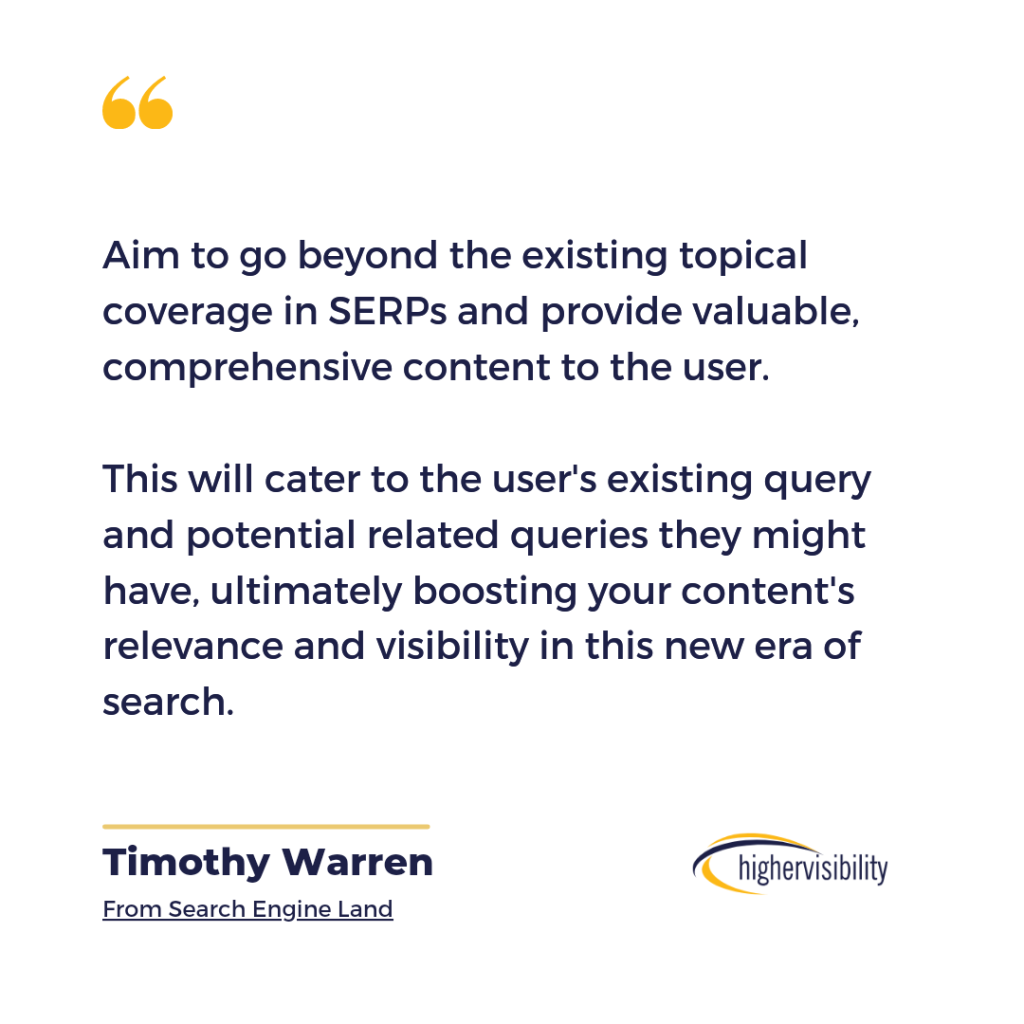22 Questions to Ask an SEO Agency Before You Hire Them
Editor’s Note: This post was originally published in August 2023 and was updated in September 2024 for accuracy and comprehensiveness.
Finding the right SEO agency can seem daunting at first.
After all, there are so many things to consider, from evaluating their track record to determining whether their SEO strategies align with your business goals and budget. You also need to ensure their company culture and communication style are a good fit for your own team.
Since picking the wrong SEO agency can be a huge drain on valuable time and resources, it’s important to know what questions to ask during the selection process.
That’s why we’ve compiled a list of 22 essential questions you should ask any prospective SEO partner. And we explain the differences between good answers and red flags.
Let’s dive in.
#1: Can you provide examples of successful SEO campaigns you’ve worked on in the past?
Anyone can claim to be an SEO expert. And only cold, hard results can separate the real pros from the snake oil peddlers.
Any reputable agency will be happy to share case studies of previous successful projects.
What to look for:
Before entering any agreement, verify that the agency can deliver as expected.
Ask for case studies relevant to your niche and company size. Since some SEO best practices differ across industries, opting for specialist agencies over generalists is often the best approach.
For example, if you’re an ecommerce business owner in the clothing industry, you’ll want to see evidence of results within the ecommerce niche.
Ideally, the agency will be able to describe how they overcame the unique challenges of operating in your niche.
Needless to say, if they’re reluctant to share case studies of previous client projects, keep your distance.
#2: How long have you been in the SEO industry? And how much SEO experience do your team members have?
Another good indicator that you’re dealing with a competent agency is their sheer time in the SEO trenches.
An agency of SEO veterans has likely encountered countless challenges over the years. And so they tend to have a good sense of what works and what doesn’t.
What to look for:
While years of experience is a useful proxy for SEO competence, it isn’t always a reliable measure.
An even better gauge of expertise is project count.
For example, imagine two agencies: Agency A and Agency B.
Agency A has been in the SEO business for ten years and handled 50 projects. Agency B only has five years under its belt but has already handled 80 projects successfully.
Which agency has the best experience? We’d say Agency B.

Of course, this doesn’t mean you should discount an agency’s total years of experience. But it’s a good idea to consider both factors.
#3: What strategies do you use to improve organic search rankings and website traffic?
SEO isn’t static.
There are constant algorithm updates, and every SEO professional understands that what’s relevant today may change tomorrow.
A good agency is always keeping up with SEO trends, constantly testing and re-evaluating assumptions to discover what works.
What to look for:
There are no magic techniques in SEO.
Agencies should be explicit about the strategies they use to improve traffic and rankings. And be willing to explain their reasoning.
They should be ready to tailor their approach to cater to your specific business needs and objectives.
Be wary of SEO agencies that claim to have any type of “special sauce” for increasing rankings. They have nothing credible to offer.
#4: How will you approach keyword research and selection for our business?
Keyword research is the foundation of any successful SEO strategy.
If you get it wrong, none of your other SEO efforts will make a difference.
This is because keywords reflect what your target customers are searching for in Google. So if you don’t target the right terms, your potential customers won’t find your site.
What to expect:
Keyword research isn’t just about going after the most searched-for terms in your niche.
Instead, it’s about understanding what search terms your target customers use at different stages of the buying journey and creating content that aligns with their search intent.
Let’s take customers in the healthcare industry as an example.
Someone in the awareness stage of the buying journey might search for general information, like “what causes back pain.”
Meanwhile, someone in the consideration stage might start comparing solutions, searching for something like “physical therapist vs chiropractor for back pain.”
And someone in the decision stage might be focused on a specific solution, searching for “best physical therapist near me.”
The point is that a good SEO agency will be able to create a customer-centric keyword research strategy that caters to all stages of the customer journey—from awareness all the way through to retention.

#5: Can you explain your link-building practices and how you ensure high-quality backlinks?
Links from other sites (backlinks) are another essential ingredient for successful SEO.
Since they build your site’s authority and relevance in the eyes of search engines, the more high-quality backlinks you have, the better your chances of ranking well.
What to look for:
Some agencies use shady link-building practices in an attempt to increase rankings or drive traffic to their clients’ sites.
These techniques include buying backlinks from spammy sites or using private blog networks (PBNs).
But if Google suspects that your site has engaged in these black-hat link tactics, you risk severe penalties.
Worthwhile agencies will only use above-board link-building strategies. So answers like these should reassure you:
- “We earn quality backlinks through creating quality content and creative digital PR campaigns.”
- “We contact thought leaders, influencers, industry leaders, webmasters who manage resources pages… for content collaboration opportunities.”
- “We earn backlinks through guest-blogging on reputable sites.”
But if an agency is tight-lipped about its link-building tactics, tick it off your list.
#6: Do you follow search engine guidelines, and how do you stay up-to-date with the latest algorithm changes?
As we’ve already mentioned, search engine algorithms constantly evolve as user behavior changes.
So, any qualified SEO provider should be up-to-speed on recent algorithm changes and know how they affect SEO best practices.
What to look for:
An SEO professional doesn’t need an encyclopedic understanding of every algorithm update.
But they should have a solid grasp of major Google announcements and search industry trends.
For example, they should be able to explain how Google’s Panda, Penguin, Core Web Vitals, and Helpful Content updates have impacted their approach to SEO in the past.
#7: What metrics do you use to measure the success of an SEO campaign?
There are countless metrics you track in SEO, from organic search rankings and bounce rates to monthly visitor counts. The list can seem endless.
Of course, virtually every business with an SEO program wants better rankings and more traffic. But it’s not just about traffic for traffic’s sake—it’s about bringing in qualified visitors who are more likely to take meaningful actions.
A reputable SEO agency knows that a successful strategy needs to be tailored to your specific goals and objectives. Anything that isn’t tied to your main KPIs is a vanity metric.
What to look for:
The agency should avoid giving you generic or one-size-fits-all responses.
Before your consultation, they should have done their homework to identify the KPIs most relevant to your business. This could involve competitor analysis or drawing from similar industry examples.
For example, if your aim is to boost brand awareness, they might track metrics such as overall reach, impressions, and engagement with your content.
But if your focus is to increase conversions, they might track rankings for transactional keywords, analyze landing page performance, and assess organic traffic conversion rates.
#8: Will you provide regular reports on the progress of our SEO efforts?
Regular SEO reports are crucial because they provide transparency and allow you to track the progress of your SEO campaigns.
They also offer insights that can be integrated into your broader marketing strategy to improve overall performance.
What to look for:
Ask to see a sample report from previous clients to get an idea of the level of detail and analysis the agency provides.
Keep in mind that SEO reports should be tailored to your specific industry and business objectives—so no two reports will be exactly the same.
It’s standard practice to receive monthly reports, but the frequency can be adjusted based on your needs.
A comprehensive SEO report should include key performance indicators (KPIs) that reflect your specific goals.
Here are some important metrics you can expect to see:
- Domain Authority/Domain Rating: Shows the overall strength of your website
- Monthly organic traffic progress: Tracks the growth of organic visitors to your site
- Backlink growth: Monitors the number and quality of links pointing to your site
- SEO health: Covers technical SEO factors such as site speed, crawl errors, and mobile-friendliness
- Organic leads/sales: Measures the direct impact of SEO on your conversions and revenue
Tip: Ensure that the agency provides clear explanations for each metric and how they contribute to your overall business growth. Reports should go beyond just numbers and offer actionable insights to guide future SEO strategies.
#9: How would you handle technical SEO issues on our website, such as site speed and crawlability?
Technical SEO is critical for ensuring that your website is properly indexed by search engines and accessible to users.
It plays a significant role in site performance, user experience, and overall search engine rankings.
A competent SEO agency should be well-versed in addressing technical issues that could hinder your site’s crawlability and indexability, including:
- Slow site speed
- 404 errors (broken pages)
- Redirect problems
- Mobile-friendliness
- Security issues (like SSL implementation)
What to look for:
Ask the agency how they plan to identify and resolve technical SEO problems that may impact your site’s rankings.
They should use industry-leading tools like ScreamingFrog, Ahrefs, Semrush, and Google Search Console to run in-depth audits and find any issues that could affect your site’s performance in search results.
A good agency will provide clear, actionable solutions—rather than just identifying problems.
#10: What is your approach to on-page optimization and content creation?
SEO has evolved from purely optimizing for search engines to focusing on user experience and engagement.
Google itself emphasizes that to succeed in SEO, your website must be optimized for users first. This is where on-page SEO comes in.
What to look for:
On-page SEO is one of the three core pillars of SEO. A reputable agency should explain its process for optimizing your website’s pages for both search engines and users.
This can include:
- Conducting on-page SEO audits: Identifying issues such as missing meta tags, poorly structured content, or slow-loading pages
- Performing competitor research: Analyzing what’s working well for competitors to inform your strategy
- Recommending actionable improvements: Providing data-driven insights to enhance your site’s user experience (UX), such as improving navigation, optimizing internal links, and refining calls-to-action (CTAs)
- Creating high-quality, relevant content: Developing content that answers user search queries and meets their needs, while also improving your site’s rankings for relevant keywords.
You should also ask whether the agency’s content creation is done in-house or outsourced. Some agencies rely on freelance writers. So it’s important to know who will be producing your content to ensure they can meet your brand’s standards.

#11: Do you have experience with local SEO and optimizing for local search results?
If you run a local business, it’s essential to pick an agency with local SEO expertise.
This is because as much as 46% of search queries are location-based. So if you don’t tap into local search demand, you’re leaving a ton of traffic (and sales) on the table.
What to look for:
Ask the agency how they plan to optimize your Google Business Profile listing.
Also ask about their approach to local content creation, citation building, and local backlink strategies.
Keep in mind that local SEO strategies differ from broader organic SEO. Your agency should know how to differentiate these two disciplines.
If the agency doesn’t discuss essential elements like schema markup, NAP consistency (Name, Address, Phone Number), or local link-building strategies, it could be a sign that they lack experience in this area.
#12: How do you perform competitor analysis and use it to inform our strategy?
Any good SEO company understands that competitor analysis is an effective and no-cost strategy for identifying what organic strategies are already working.
What to look for:
The agency should demonstrate a clear understanding of how to conduct comprehensive competitor analysis.
This includes analyzing competitors’ keyword strategies, backlink profiles, content performance, and site structure.
By doing so, they can identify gaps and opportunities for your business to capitalize on. This might include targeting untapped keywords, improving upon your competitors’ content, or earning backlinks from reputable sites that your competitors haven’t targeted.
#13: Can you provide references or testimonials from past clients?
As we mentioned earlier, anyone can claim to be an SEO expert.
So before committing to an agency, you should check out what other clients have said about them.
What to look for:
Ask for references or testimonials from past clients. Positive testimonials are a good sign, but actual client references offer even more valuable insights into the agency’s reliability, communication, and ability to deliver on its promises.
Reach out to the references they provide and ask about their experience, particularly in terms of communication, transparency, and the tangible results they achieved. This will give you a clearer sense of what to expect from the agency.
If the agency is reluctant to provide references or makes excuses—such as citing non-disclosure agreements—it could be a red flag. A legitimate agency should be able to share some form of client feedback to demonstrate its capabilities and trustworthiness.
#14: What is your pricing structure, and what services are included in your packages?
Understanding an SEO agency’s pricing structure is crucial for managing your budget and ensuring you’re getting the most value from your investment.
Agencies may charge a flat fee, hourly rates, or offer tiered packages—so it’s important to know exactly what you’re paying for and if there are any hidden costs.
What to look for:
A transparent agency will provide a clear breakdown of costs and services.
Ensure you know what specific services are included in each type of package. For example, does the package cover keyword research, technical audits, content creation, link-building, and ongoing reporting?
Understanding what’s included helps you avoid paying for services you don’t need.
Also, depending on your business needs, ask if they offer customized packages. This flexibility ensures that you’re only paying for services that directly contribute to your goals.
#15: Do you offer any guarantees for achieving specific rankings or results?
This is the easiest way to distinguish genuine agencies from fake ones.
The reality is that no one can predict or control search engine algorithms with certainty. So SEO guarantees shouldn’t be trusted.
SEO is a long-term process that involves ongoing testing, analysis, and adaptation. Credible agencies understand this and focus on creating data-driven strategies that evolve with industry trends rather than offering unrealistic promises.
What to look for:
If they’re authentic, they’ll be upfront about the inherent uncertainty of SEO outcomes.
They won’t guarantee specific rankings or results, but they will emphasize building a strong, adaptable strategy designed to improve your site’s overall performance—regardless of algorithm updates.
Steer clear of any agency that promises a specific result. They’re probably using unethical tactics.
#16: How do you communicate with clients, and what level of involvement do you expect from us?
Effective communication is the foundation of any successful partnership.
For your SEO campaign to thrive, you need an agency that maintains clear, consistent, and transparent communication. It’s important to remember that collaboration is key, and the relationship works best when both sides are actively involved.
What to look for:
A reputable agency will take the time to ask detailed questions about your business, industry, target audience, goals, and KPIs.
They should be genuinely interested in understanding your unique needs before proposing strategies or discussing costs. So if an agency skips this step and focuses only on payment or vague promises, consider it a red flag.
Also, inquire about their communication frequency and style. Will they provide regular updates, schedule routine meetings, or offer detailed reports? Knowing how they plan to keep you informed is crucial to ensure you’re always aware of progress and new challenges.
Likewise, clarify the level of involvement they expect from you.
#17: Will you help us with website analytics and setting up conversion tracking?
There’s no way to measure SEO results without tracking.
A good SEO agency understands the importance of monitoring traffic, conversions, and other performance metrics.
They should have a dedicated team specializing in website analytics and conversion tracking. The team will work with you to set up your Google Analytics account and configure your conversion goals based on your marketing KPIs.
This ensures you receive real-time insights into what’s working and where improvements are needed.
What to look for:
Ask the agency how they handle setting up and optimizing analytics tools like Google Analytics, Google Tag Manager, and other tracking platforms.
They should be able to explain how they will configure goals based on your unique business objectives, such as lead generation, sales, or user engagement.
#18: How will you handle mobile SEO and ensure our site is optimized for mobile search?
Most searches are now performed on mobile devices. And since Google’s switch to mobile-first indexing, the mobile version of your site is prioritized for ranking purposes.
Needless to say, mobile optimization is critical for SEO success.
What to look for:
The agency should have a clear strategy for optimizing your site for mobile.
This includes ensuring responsive design (so your site functions smoothly across all screen sizes), improving mobile page load speed (since slow-loading pages cause users to leave), and ensuring mobile-friendly navigation (so users can easily find what they need).
#19: What is your approach to content updates and SEO maintenance?
SEO is not a one-time effort.
Search engine algorithms evolve, new competitors emerge, and user behavior changes over time.
For this reason, regular content updates and ongoing SEO maintenance are essential for sustaining and improving rankings.
What to look for:
The prospective agency should explain how they will continuously monitor your website’s performance and identify opportunities for improvement.
This means conducting regular SEO audits to check for broken links, site speed issues, crawl errors, and other factors that could affect your rankings.
It also means having a clear plan for keeping your content relevant and aligned with search trends, including updating outdated pages, refreshing old blog posts, and maintaining strong internal linking structures.
#20: How will you ensure our SEO strategy aligns with our other digital marketing efforts?
Your SEO program shouldn’t exist in a silo.
To maximize results, your SEO strategy needs to align with your broader digital marketing efforts, such as content marketing, paid advertising, social media, and email campaigns.
What to look for:
The agency should discuss how they will integrate SEO with your other marketing channels.
This includes coordinating keyword strategies with content marketing to ensure that blog posts, landing pages, and product descriptions are optimized for search engines.
They should also explain how SEO insights can inform PPC campaigns, helping you target the most profitable keywords for both organic and paid search.
Moreover, the agency should outline how they will use SEO to complement your social media efforts, ensuring content is shareable and engaging across platforms.
#21: How do you handle seasonal changes or fluctuations in search trends?
Certain industries experience significant fluctuations in search traffic due to seasonality, holidays, or changing trends.
Your SEO agency should have a plan to adapt your strategy during these periods.
What to look for:
The agency should demonstrate an understanding of seasonal search trends specific to your industry.
This means explaining how they monitor and adjust keyword strategies based on seasonal demand and consumer behavior.
A good agency will also have a strategy for preparing your site in advance for high-traffic periods, such as optimizing specific landing pages, improving site performance, and ensuring your content is relevant to seasonal queries.
They should also discuss how they’ll manage off-season periods, potentially by targeting evergreen content or introducing new strategies to drive traffic during slower months.
#22: How would you handle negative SEO or competitors attempting to sabotage our rankings?
Negative SEO occurs when competitors or malicious actors use unethical tactics—such as building harmful backlinks or duplicating content—to damage your site’s search engine rankings.
It’s important that your SEO agency is prepared to detect and mitigate such attacks.
What to look for:
The agency should explain how they regularly monitor your site for suspicious activity, including toxic backlinks, scraped content, and sudden drops in rankings.
The agency should also have a clear plan for disavowing or requesting the removal of harmful backlinks.
Why Choose HigherVisibility as Your SEO Agency?
At HigherVisibility, we don’t make empty promises. We work diligently to ensure you get high returns on every dollar spent working with us.
And because we consistently deliver an excellent client experience, we’ve been awarded Best SEO Agency of the Year four times!
This didn’t come easy, though. We pride ourselves on hiring seasoned digital marketing experts. And we’re constantly seeking better ways to improve our clients’ rankings, traffic, and conversions.
If that sounds good to you, please don’t hesitate to request a free SEO proposal from us today.st a free custom strategy.
